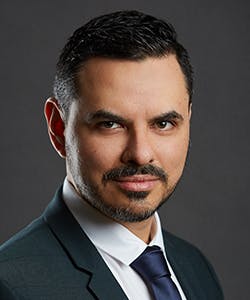It’s time for industry to come together to promote sustainability and protect the planet
Oswaldo “Oz” Rodriguez is a technologist with a background in software engineering, and is currently the head of product Go-To-Market strategy with Lloyd’s Register digital products. His LinkedIn profile also says one of his goals is to save the world by building one cool product at a time. Plant Services editor in chief Thomas Wilk met Oz several years ago at the ARC Industry Forum, where they talked about the value that a shared library of asset data could bring to industry. In this interview, Oz suggests it’s time for industry to come together in similar manner to promote sustainability and protect the planet.
PS: We’ve had our pick of crises the past couple of years, worldwide. Not only current events over in eastern Europe, but also as you said, sustainability issues and the COVID pandemic. Industry has been heading in a more sustainable direction for some time. Do you agree that currently there might be a different sort of urgency or opportunity in this area for industry?
OR: I agree, and I think that the catalyst was last year’s COP26. It was the first time that we really met as an industry, as a planet, and looked at this as something that we need to do. It’s not about income, it’s not about cost cutting, it’s not about safety. It’s about we surviving as a species, making sure this planet is fit for purpose.
And I think that by having that meeting and coming out with so many great discussions, thought leaders, presidents of countries making pledges like the Global Methane Pledge, right? Now we have KPIs, and we have a timeline. I think this is the first time that we actually have a goal we want to reduce this much by this time, and that makes it real. That brings it into perspective.
This article is part of our monthly Big Picture Interview column. Read more interviews from our monthly Big Picture series.
It’s not a politician saying, “we’re going to reduce methane emissions by 2050.” You have no idea what’s the goal. Now, I feel like with that goal in mind, it has come into scrutiny because now we can measure ourselves: “Did we do a good job on meeting those goals?” So I think that’s why it’s front and center on everybody’s agenda, to be honest.
The interesting part and where I see the risk lies is that all of these pledges and commitments and goals and ambitions were made at a country level, but it’s up to us in the industry on every part of the supply chain to make sure we are aligned so that we can meet these goals. It’s not a sense of the USA or Canada or the UK that is going to meet the goals; it’s the industries, it’s the companies. It’s us as part of this industry that is going to be able to say, “yes, we came together as an industry, we looked for solutions, we looked for innovations, we looked at transforming the way we do business so that we can be profitable, but at the same time that we can help the environment and our communities.” And if in 2030 we’re able to say, yes, we did it, not only have we advanced as an industry, I think we have advanced as a society.
PS: Do you think that sustainability efforts will bring a new or different kind of information sharing among plants and in their parent organizations to help promote best practices for goals like methane reduction or zero waste to landfill?
Why industrial plant teams need to embrace their creativity to achieve greater success
Why you should automate overall equipment effectiveness data collection
OR: I think so, and I think that the key change is that I don’t think the companies view that as a competitive advantage anymore. I think in this case, you are reducing methane emissions or you going into a lower energy consumption or better waste management process, I really hope that it becomes a platform for companies, even competitors, to talk among themselves and say, “do this.”
Because, again, it’s not about saving money. It’s not about being more competitive and getting more value to the shareholders and stakeholders, but we’re all in this together. We’re really running out of time to make decisions and changes so that we stop harming our country, our planet, to our earth, and which may be irreparable if we don’t stop. So it’s not about I’m going to make more money than you. Let’s do this together as an industry, let’s do this as the sites of this region, and let’s show that we can work together.
Now, competitive advantage would lie on other parts of the supply chain, on the quality of your products, on the engineering expertise, but I think this needs to be a shared knowledge. It should be like a Wikipedia where everybody in the industries can look. And not only oil and gas, but everybody outside—car manufacturing and food and beverage and mining. I think it’s really important that we start building common practices because once we do that, and once we really adopt them, that’s where we start seeing the changes. And that only happens if we come together.
This story originally appeared in the April 2022 issue of Plant Services. Subscribe to Plant Services here.

